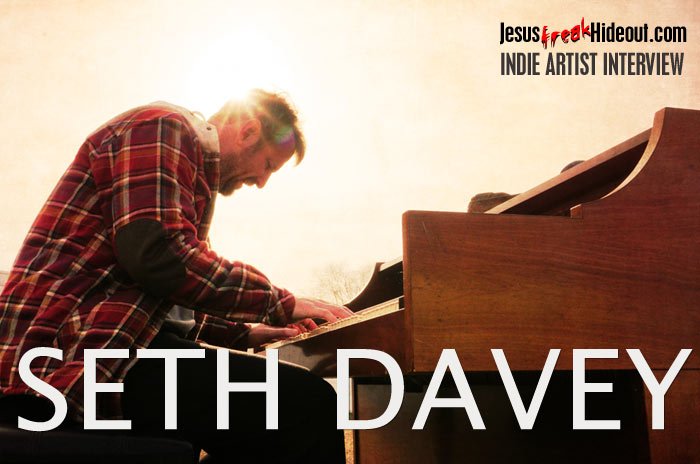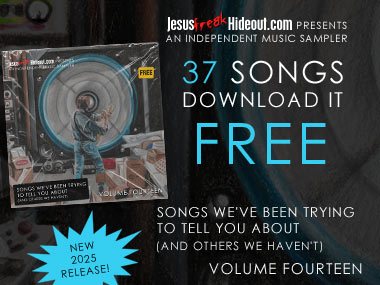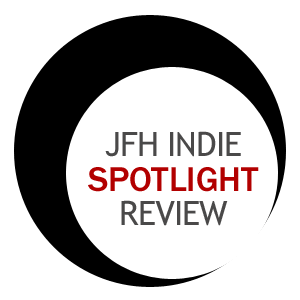Musically, this one differs quite a bit from the previous. “39 Years and Counting” was strongly steeped in keys and strings and has a lush sound, but “The Highs and the Lows” plays off more like folk-rock song a la Mumford and Sons or something similar. Acoustic guitar, electric guitar, piano, strings, and more are all present here, and there’s a joyous feeling happening. A standout moment in the arrangement is the slowdown that happens for the first half of the bridge, followed by the big triumphant sounding second half as it builds back into a half-time chorus. A cool shift happens here, and it sets things up for a more interesting ending to the song.
Seth Davey has really stepped up his game with recent singles, and I’m starting to see his vision. I, for one, am excited about the prospect of a full ten-track album versus a five-track EP — especially if these two songs are any indication. Fans of Davey’s previous work in Attalus, his previous solo work, or fans of folk-rock bands like Mumford and Sons should undoubtedly give Davey’s newest release a listen.
– Review date: 9/17/25, written by Michael Weaver of Jesusfreakhideout.com
JFH Staff’s Second Opinion
– Review date: 9/11/25, written by Scott Fryberger of Jesusfreakhideout.com
Record Label: None
Album length: 1 track: 4 minutes, 11 seconds
Street Date: August 22, 2025
Buy It: Amazon Music

Seth Davey: Juxtaposition is the perfect word for it, because that is precisely what our lives of faith are in relation to Christ. Our futile, finite, incomplete works are juxtaposed against His pure, perfect, and finished work. The agony we feel over our sin and shame is a juxtaposition against the agony He felt in bearing our sin and shame at Calvary. Against His strength, we feel our weakness; against His light, we sense our darkness; against His wisdom, we perceive our foolishness; against His resilience, we understand our fickleness. And on and on. Yes, and that is also part of the meaning behind the title, “Words in the Wounds.” But I’ll let the lyrics speak for themselves when the record arrives.
Seth: I’m recording vocals, piano, violin and cello myself, at my makeshift home studio, but I’ve teamed up again with fellow artist and producer, Andrew McLeod (Reckless Records) to complete the instrumentation. Andrew is a gifted singer, pianist, and songwriter for the bands Two Dimensional and Waiting on Amy, but for my project he’s recording acoustic guitar, bass, and electric guitar, as well as mixing and mastering. I’ll be meeting with a session drummer named Henry this week to finish the drums. To that end, please pray with me for the LORD to bring other instrumentalists along in the coming months so that I can finally begin to perform full-band concerts again. Recording multiple instruments is a joy. But participating with a live audience in worship is a greater joy, yet finding quality musicians who have both the time and the desire to perform these songs with me during this stage of life has been difficult. I’m a husband and father of three. Most of my friends are also husbands and fathers in their mid-to-late thirties. And Angier, NC ain’t Nashville!
Seth: Great question. I technically wrote the song nine years ago, immediately after leaving my former band, Attalus, and it became one of nine songs that I recorded on a bare-bones worship album called Till You’re All I See. I remember writing all of those songs relatively quickly, probably within a week or so, as a sort of detox from the seven years I’d spent writing and playing Christian rock music. The entire album was inspired, in part, by a spiritual need to unplug from all the gadgetry–the loud amps, the sound systems, the electronic instruments–and offer a quieter, simpler song to God, but with a seven-year music ministry suddenly in the rearview, I also felt a disquieting sense of purposelessness. God can pull me away from music because He doesn’t need my music, and that’s a bittersweet reality. Bitter, because it means I have nothing worthwhile to give. Sweet, because He delights in my gift regardless.
Seth: The answer is sometimes in the question, I suppose! In truth, the folk-rock drive, with the constant kick drum and the clapping hands and the fast-strumming acoustic guitars and the focus on unplugged stringed instruments, was already a direction I’d been leaning in when composing Kingdom Rising two years ago. Back then, I just knew I wanted to leave behind the post-rock world of ambient, distorted electric guitars, and instead fill up the sonic space with more orchestral, earthy instrumentation; which, let’s be real here, is only a small step away from full-blown folk.
I never really listened to Mumford & Sons during their heyday, but I always liked the feel of that one song “I Will Wait,” and it came to mind one night as I sat at my piano re-composing a more triumphant version of “The Highs and Lows.” However, ironically, despite what I just said above, I remember thinking when listening to “I Will Wait” that it wasn’t quite the sound I was after, which surprised me. What’s missing in it? I thought. Well, the answer was obvious: electric guitar. So I effectively told Andrew McLeod something like, “Listen, I don’t want any big, distorted, post-rock kind of guitars–I’m not trying to reproduce Attalus; oh no, I’m still very much an acoustic-rock kind of guy now–but I think we need to beef up the sound with some clean electrics.” Well, he did, on both “39 Years and Counting” and “The Highs and Lows,” and I haven’t looked back ever since.
Words in the Wounds will explore a wider array of sounds, however. I’ve loved experimenting with the faster, more folk-style sound of “The Highs and Lows,” and it is definitely a rhythmic thread that weaves throughout the entire record, but the album will also feature songs that are more alt-rock, as well as a couple of Attalus-type ballads. To me, these driving, folk elements are just another extension of the energetic but semi-unplugged rock-style worship of Kingdom Rising, and a natural progression from it, rather than a change in a different direction.
Seth: Inspiration! Typically, once a concept for an album has finally formulated in my mind, my problem is that I write too many songs and then need to decide which to cut for time. Funny story about that: for those unfamiliar with my former band, Attalus, our opus album was a sixteen-song concept album called Into the Sea, which took us a couple of years to write and record, but it all came about one fateful night when a certain band member demanded that we put one of my songs called “All Hands on Deck” on the next record. Well, that demand created a big headache for me since I was already making progress on a new concept album called Saints/Devils which had absolutely nothing to do with a nautical theme. Nevertheless, seeing that my bandmate was resolute in his demand, I said something to the effect of, “Okay, look, what if we just put out a four or five-song EP called Into the Sea; we’ve already got a few sea-themed songs, like “Message in a Bottle,” “Into the Sea,” and “The Greater Tide,” so we can just write one more and put it out as a filler album before our full-length project.” So much for that. By the time Into the Sea was finished, I’d written close to twenty songs for the record and we ended up cutting four, including “All Hands on Deck,” which was the whole reason we set out to record the album in the first place. Oh, the irony!
Words in the Wounds could’ve been a 15-song album as well, but I’ve cut it down to 10, partly to keep costs down, but more so because I want to be able to keep the record to 45 minutes so that I can finally print a vinyl.
Seth: Andrew and I have been working hard on the album for three weeks now and are making great progress. LORD willing, we’ll finish all production by the end of October.
Seth: Touring is contingent on me finding five or six guys to go with me–drums, cello, bass, acoustic, electric, violin–so that I can really give the songs their full orchestral range, but we’ll see what the LORD allows. I am hoping to have a CD release concert at my church in February, so stay tuned for that. Still working out the details.
Seth: I appreciate that question very much. Honestly, I’m almost forty now and I’ve been feeling old ever since I left Attalus. Been struggling with questions like, “LORD, what’s this for? Why now?” I’m usually up till two in the morning because that’s when my wife and kids are fast asleep and I can burn the midnight oil writing and recording. But that takes a toll. When I was in my twenties, I rented a band house with two other guys and we could play music whenever we wanted. We could play concerts and take off work on a whim. It was a lot easier to develop and craft art back then. Plus, with four other guys alongside me, each with different friends and co-workers and ministry partners, we had access to a larger pool of people interested in the music. So I feel incredibly isolated these days, and that’s a foothold for the enemy. Some nights I’ve almost thrown in the towel on music altogether. Depression is tough–we all have our version of it. But one of the songs from the album is taken from Psalm 42, where the Psalmist says, “Why are you downcast, O my soul? Hope in God!,” and I’ve been repeating that phrase a lot lately.
When I wrote these words to the title track, I meant them, and I appreciated the poetic force of the lines–I’d been philosophically musing at those fathomless depths of our Savior’s wounds for a while–but this past weekend, during a very distressing talk with a friend, and through the spiritual questioning that followed, the words were a call to me. Sometimes, I can get so caught up in poeticizing about the love of Christ and singing at the top of my lungs about the love of Christ and playing new melodic strands in honor of the love of Christ, but all the while fail to sense my present and immediate and desperate need for the love of Christ. Ah, but then a marvel of grace happens! Then, suddenly, Almighty God stoops down as it were to whisper in my ear the very words I’d written as a psalm, and I become aware of His sufficiency through my deficiency, aware of the juxtaposition of grace reaching me in the crevices of my common life–of the relationship between my feeble attempt to offer anything of value and of His inspiring breath that fuels the offering.
Listen to the words in the wounds
Listen to the voice calling “Come out from that tomb!”
Listen as the veil tears apart
Listen to the rhythms of Redemption’s beating heart



